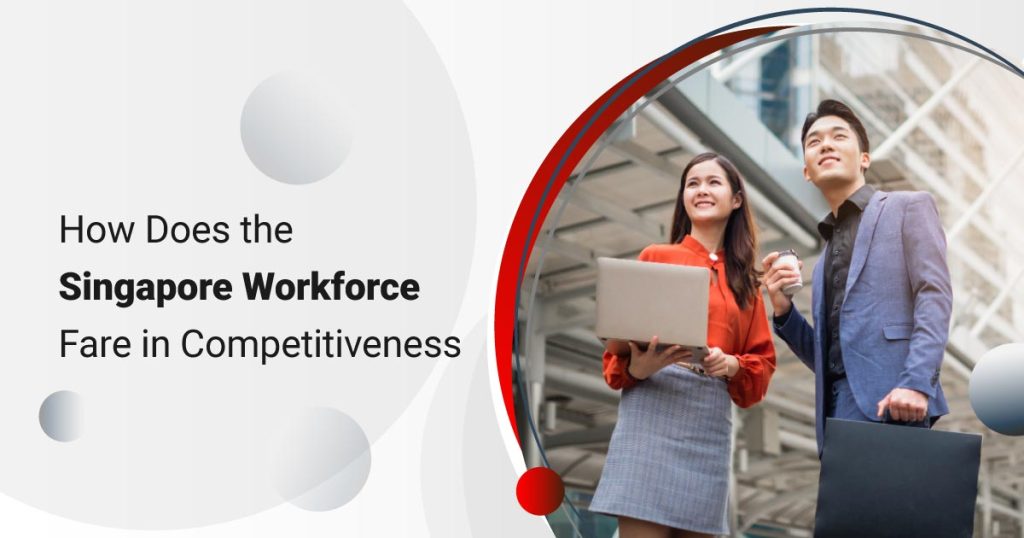In the contemporary global economy, talent competitiveness is a crucial determinant of a nation’s success. Within this worldwide race for talent, Singapore, renowned for its robust economy, political stability, and strategic geographical location, has been an epicentre for global talent for decades.

Due in no small part to this talent pool, the tiny city-state has developed a reputation for being an economic powerhouse, seamlessly integrating technology and innovation into its workforce management.
uBut what is the actual, current state of Singapore’s talent competitiveness? The aim of this article is to unravel the nuances of Singapore’s talent landscape in 2024. It will enlighten business leaders, both foreign and local, who are keen to understand Singapore’s workforce, and its appeal for companies contemplating expansion or establishment in the region.
Singapore’s Workforce Proficiency: An Analysis Based on INSEAD’s Findings
Singapore’s workforce is not just a national asset but a globally acknowledged dynamo, as illuminated by the INSEAD study. This analysis, a part of the annual Global Talent Competitiveness Index, provides a detailed assessment of how countries fare in terms of talent capabilities.
The INSEAD Global Talent Competitiveness Index: A Benchmark for Talent
The Index, a collaborative effort by INSEAD, the Descartes Institute for the Future, and the Human Capital Leadership Institute, evaluates 134 countries. It measures their proficiency in attracting, developing, supporting, and retaining talent, making it a comprehensive barometer of global talent landscapes.
Singapore’s Standout Performance in the INSEAD Study
- Top Three in Four of Six Criteria: Singapore impressively made it to the top three in four out of six criteria measured by the Index. These criteria include enabling, attracting, growing, and retaining talent, as well as vocational and technical skills, and global knowledge skills.
- First in Global Knowledge Skills: In an era where knowledge is as valuable as physical resources, Singapore leads the pack, ranking first globally in knowledge skills. This category encompasses management and communication abilities – critical skills in today’s interconnected global economy.
- Third in Vocational and Technical Skills: The nation also excels in vocational and technical skills, coming in third globally. This highlights Singapore’s focus on practical, hands-on skills that are vital in today’s technologically driven world.
- Overall Country Ranking: Singapore maintained its second-place standing from the previous year in overall country rankings, trailing only behind Switzerland, and surpassing the United States, which took the third spot.
Implications for Business Expansion in Singapore
- A Talent-Rich Environment: For businesses, these rankings signal a thriving environment rich in talent. Establishing or expanding operations in Singapore means access to top-tier management expertise and a technically skilled workforce.
- Global Knowledge Hub: Singapore’s leading position in global knowledge skills translates to a workforce adept in management and communication, essential for businesses operating in a globalised context.
- Technical and Vocational Expertise: The high ranking in vocational and technical skills assures businesses of a workforce that is not only theoretically sound but also practically skilled.
Challenges and Forward Strategy
- Sustaining the Talent Pool: Despite these accolades, Singapore faces the challenge of continuously nurturing and retaining this talent pool. Balancing local talent development with the attraction of global talent is key.
- Adaptation and Continuous Learning: To keep up with the evolving global business and technological landscape, Singapore’s workforce must remain committed to adaptation and continuous learning.
Talent Attraction and Retention: Singapore’s Strengths and Challenges
Singapore’s High Ranking in Talent Attraction and Enabling Skills
Singapore’s ability to attract global talent is remarkable, backed by its robust economy, political stability, and status as an innovation hub. The presence of major tech firms, including 80 of the world’s top 100 tech companies like Google, IBM, and Microsoft, along with innovative companies like Zoom, ByteDance, and Tencent, is a testament to Singapore’s appeal.
Challenges in Retaining Talent
Despite its success in attracting talent, Singapore faces significant challenges in retaining it. According to a report by GlobalManpower, Singapore was ranked as the third most talent-starved country out of 40, with 84% of companies reporting talent shortages.
This shortfall is partly due to the high demand in the ICT sector, which is expected to need an additional 60,000 workers by 2023, while local educational institutions produce only around 2,800 ICT graduates annually.
The Concept of ‘Brain Circulation’ and its Impact on Singapore’s Talent Pool
The phenomenon of ‘brain circulation’ – the continuous flow of talent across borders – is particularly pertinent in Singapore. While this movement brings fresh skills and perspectives, it also leads to a transient workforce, posing challenges for long-term talent retention.
While ‘brain circulation’ isn’t a significant handicap for Singapore, the country can benefit from the experience and skills these talents bring, even if their stay is temporary.
Comparatively, economies like Switzerland and the Nordic nations have successfully retained talent by offering a higher quality of life, suggesting a potential strategy for Singapore to enhance its talent retention.
Singapore’s Response to Talent Retention Challenges
Initiatives and Policies to Enhance Talent Retention
In the face of talent retention challenges, Singapore has adopted a proactive stance. Key initiatives include the introduction of the Tech.Pass, and the Overseas Networks & Expertise (ONE) Pass. The Tech.Pass, targeting established foreign tech entrepreneurs, leaders, and experts, is designed to bridge the gap in the digital workforce.
The ONE Pass, a flexible five-year work permit, allows high-earning individuals or those with outstanding achievements to work for multiple companies in Singapore. This pass is a strategic move to attract and retain top-tier global talent, especially critical in sectors facing global shortages.
Comparison with Other Small Economies’ Strategies for Talent Retention
Singapore’s approach to talent retention stands out when compared to other small economies. It is not just about attracting global talent; the focus is equally on nurturing local talent. This dual strategy is evident in initiatives like the reduction of the Dependency Ratio Ceiling in the services sector, aimed at encouraging the hiring of local talent.
Programmes like the Singapore Global Executive Programme (SGEP) and the SkillsFuture initiative reflect a commitment to investing in the career development of local talent.
SGEP supports local companies in enhancing the skills of their staff, while SkillsFuture provides opportunities for Singaporeans to develop skills throughout their careers. In 2020 alone, SkillsFuture assisted 540,000 Singaporeans.
HR Outsourcing as a Strategic Move for Talent in Singapore
The Role of HR Outsourcing in Managing Talent Challenges
In Singapore, HR outsourcing has become a pivotal strategy for companies navigating the complexities of talent management, allowing businesses to focus on their core competencies while leveraging the specialised expertise of external HR professionals.
HR outsourcing effectively addresses diverse talent management aspects, from recruitment to employee engagement and compliance with local employment laws. This strategic move is particularly advantageous in a talent-competitive environment like Singapore, where managing a diverse workforce requires precision and adaptability.
Benefits of HR Outsourcing for Companies in Singapore
The advantages of HR outsourcing for Singaporean companies are various:
- Access to Global Talent Pools: Outsourcing HR functions often means tapping into the service provider’s extensive global network, broadening the talent pool beyond local markets.
- Cost Efficiency: It offers a cost-effective solution for managing HR functions, especially for SMEs and startups. By outsourcing, companies can avoid the overheads associated with maintaining a full-fledged in-house HR department.
- Adaptability: Outsourced HR services provide the agility to adapt to changing talent needs and market conditions, crucial in Singapore’s dynamic business landscape.
Examples of Successful HR Outsourcing Models in Singapore
In Singapore, successful HR outsourcing models typically involve partnerships with global HR specialists like InCorp, known for their expertise in the region. These partnerships have proven effective in various ways:
- Streamlined Recruitment Processes: Outsourcing recruitment has helped companies efficiently manage hiring processes, from sourcing to onboarding, particularly in sectors facing talent shortages.
- Enhanced Employee Engagement: External HR experts bring in new perspectives and strategies to boost employee engagement, which is key to talent retention.
- Workforce Productivity Improvements: By handling complex HR tasks, these firms enable companies to focus on productivity and business growth.
HR outsourcing has emerged as a strategic solution for Singaporean companies to navigate the challenges in talent management. It provides access to a wider talent pool, delivers cost savings, and enhances operational efficiency. As Singapore continues to solidify its position in the global business arena, the role of HR outsourcing in managing and nurturing talent will remain crucial.
Where to Next With InCorp
Singapore’s journey in navigating the complex terrain of talent competitiveness is a story of strategic foresight and adaptability. From attracting global talent to nurturing local expertise, the city-state has set benchmarks in workforce proficiency and talent management.
For businesses looking to leverage Singapore’s competitive edge in talent, understanding these dynamics is key to success. InCorp stands ready to guide you through these nuances, offering expert advice and strategic solutions tailored to your business needs.
Whether it is navigating HR outsourcing, understanding local talent policies, or tapping into Singapore’s rich talent pool, we are your ideal partner. Contact InCorp today to unlock the full potential of Singapore’s workforce for your business.
FAQs on Singapore Workforce
- Singapore is recognised globally for its highly skilled workforce, ranking highly in the INSEAD Global Talent Competitiveness Index due to its ability to attract, develop, and retain talent. Its strategic location, robust economy, and innovative policies contribute to this status.
- HR outsourcing in Singapore offers benefits such as access to global talent pools, cost efficiency, and adaptability to changing market conditions, making it a strategic choice for businesses.
- InCorp provides expert advice and strategic solutions in HR outsourcing, understanding local talent policies, and accessing Singapore's talent pool, helping businesses navigate the complexities of talent management effectively.






